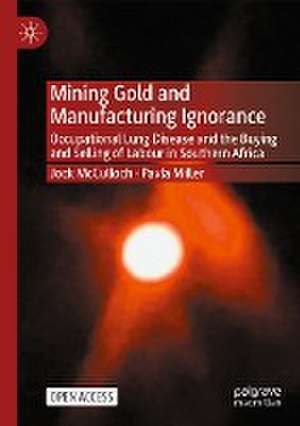Mining Gold and Manufacturing Ignorance: Occupational Lung Disease and the Buying and Selling of Labour in Southern Africa
Autor Jock McCulloch, Pavla Milleren Limba Engleză Paperback – 21 mar 2023
For most of the twentieth century, South Africa was the world’s largest producer of gold. Although the country enjoyed a reputation for leading the world in occupational health legislation, the mining companies developed a system of medical surveillance and workers’ compensation which compromised the health of black gold miners, facilitated the spread of tuberculosis, and ravaged the communities and economies of labour-sending states. The culmination of two decades of meticulous archival research, this book exposes the making, contesting, and unravelling of the companies’ capacity to shape – and corrupt – medical knowledge.
| Toate formatele și edițiile | Preț | Express |
|---|---|---|
| Paperback (1) | 343.02 lei 6-8 săpt. | |
| Springer Nature Singapore – 21 mar 2023 | 343.02 lei 6-8 săpt. | |
| Hardback (1) | 412.36 lei 6-8 săpt. | |
| Springer Nature Singapore – 21 mar 2023 | 412.36 lei 6-8 săpt. |
Preț: 343.02 lei
Preț vechi: 361.07 lei
-5% Nou
Puncte Express: 515
Preț estimativ în valută:
65.64€ • 68.71$ • 54.31£
65.64€ • 68.71$ • 54.31£
Carte tipărită la comandă
Livrare economică 05-19 aprilie
Preluare comenzi: 021 569.72.76
Specificații
ISBN-13: 9789811983290
ISBN-10: 9811983291
Ilustrații: XIII, 459 p.
Dimensiuni: 148 x 210 mm
Greutate: 0.56 kg
Ediția:1st ed. 2023
Editura: Springer Nature Singapore
Colecția Palgrave Macmillan
Locul publicării:Singapore, Singapore
ISBN-10: 9811983291
Ilustrații: XIII, 459 p.
Dimensiuni: 148 x 210 mm
Greutate: 0.56 kg
Ediția:1st ed. 2023
Editura: Springer Nature Singapore
Colecția Palgrave Macmillan
Locul publicării:Singapore, Singapore
Cuprins
Chapter 1: Introduction..- Chapter 2: A most modern industry: the migrant labour system and crisis management: 1880 -2022.- Chapter 3: Mapping and resolving a health crisis: 1902 -1929.- Chapter 4: Identifying risk and compensating tuberculosis: 1916 - 1957.- Chapter 5: Lifting the ban on the recruitment of Tropical labour: 1933-1945.- Chapter 6: The research community, risk and evidence: 1912 - 1932.- Chapter 7: Tuberculosis, malnutrition and mining in South Africa: 1903 - 1960,- Chapter 8: Tuberculosis and migrant labour in the High Commission Territories: Bechuanaland: 1985-1998.- Chapter 9: Tuberculosis and migrant labour in the High Commission Territories: Basutoland and Swaziland: 1912-2005.- Chapter 10: Contests over labour in British central African colonies: 1935 - 1953.- Chapter 11: Dissenting voices: 1902 -1956.- Chapter 12: The career of A. J. Orenstein: 1914 - -1960.- Chapter 13: Technologies, care and repatriations: 1926-1966.- Chapter 14: Things fall apart: independent research, asbestos litigation, and the gold miners’ class action: 1983 - 2019.- Chapter 15: Conclusion: records, bodies and contested justice.
Notă biografică
Jock McCulloch (1945 - 2018) was one of the foremost historians of occupational health of his generation. He also wrote on colonization, race relations, and psychiatry. Jock was Emeritus Professor of History at RMIT University (Australia), and fellow of both the Australian Academy of the Social Sciences and the Academy of the Humanities.
Pavla Miller is Emeritus Professor of Historical Sociology at RMIT University (Australia). She wrote Long Division: State Schooling in South Australian Society; Transformations of Patriarchy in the West; and Patriarchy. An interdisciplinary scholar, she also published on explanations of low fertility, masters and servants’ legislation, children’s work, and the Australian National Disability Insurance Scheme.
Textul de pe ultima copertă
This open access book charts how South Africa’s gold mines have systematically suppressed evidence of hazardous work practices and the risks associated with mining.
For most of the twentieth century, South Africa was the world’s largest producer of gold. Although the country enjoyed a reputation for leading the world in occupational health legislation, the mining companies developed a system of medical surveillance and workers’ compensation which compromised the health of black gold miners, facilitated the spread of tuberculosis, and ravaged the communities and economies of labour-sending states. The culmination of two decades of meticulous archival research, this book exposes the making, contesting, and unravelling of the companies’ capacity to shape – and corrupt – medical knowledge.
Caracteristici
Makes a key contribution to African history by redefining the place of the gold mining industry in the world economy Charts the making and contesting of the mining companies’ capacity to shape and corrupt medical knowledge Brings together two decades of meticulous archival research This book is open access, which means that you have free and unlimited access
